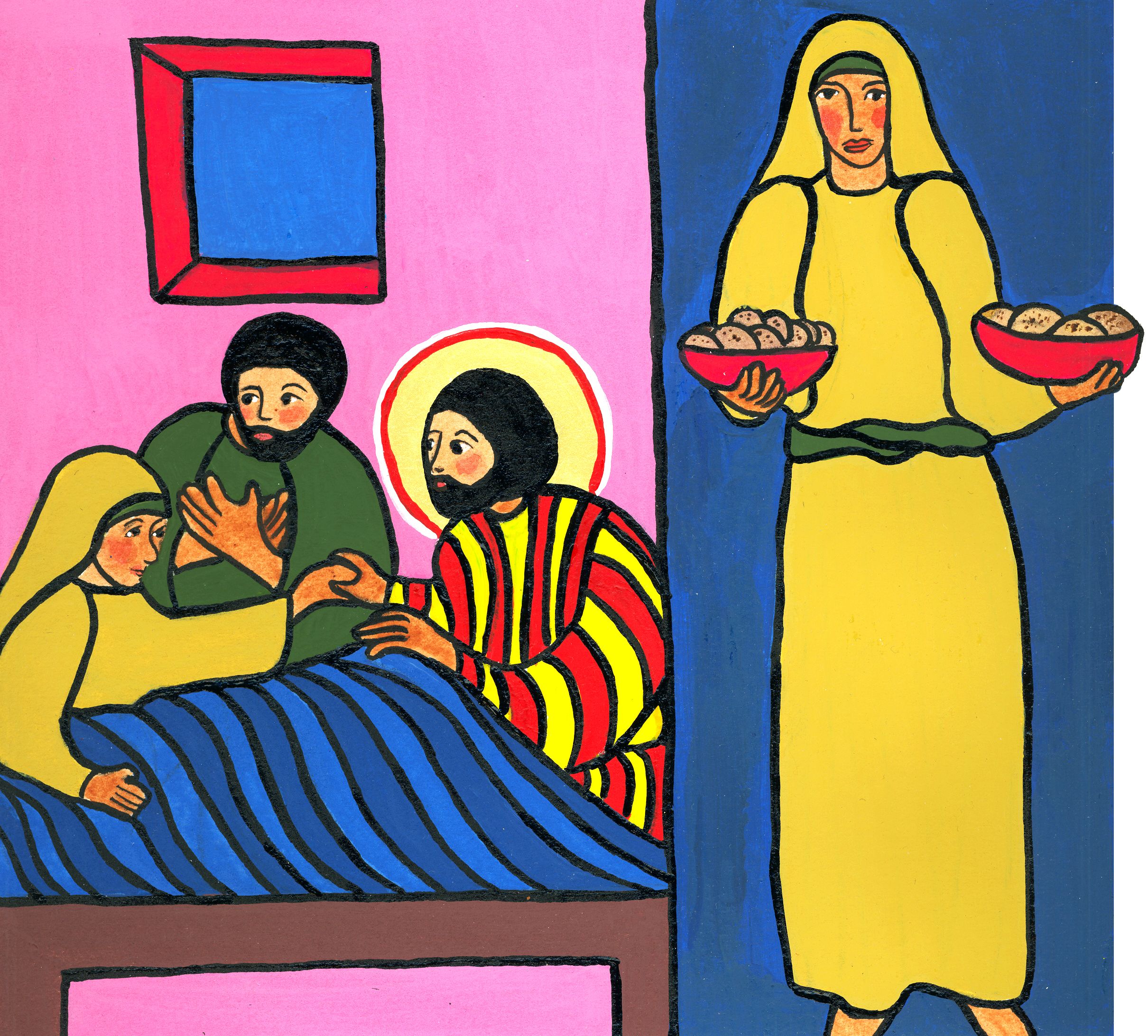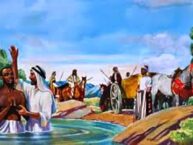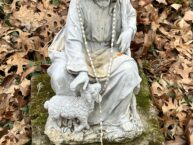 February 4, 2024: Arise, shine! For your light has come, and the glory of the Lord has risen upon you. Amen.
February 4, 2024: Arise, shine! For your light has come, and the glory of the Lord has risen upon you. Amen.
Hey – did you’all see that bright thing in the sky? NJ.Com, a local news source, posted on their Facebook page this important bulletin: “Strange glowing orb spotted over New Jersey Saturday. Remain calm.” I heard a rumor that it was the sun! And, good ole Punxsutawney Phil didn’t see his shadow! Thanks be to God!
All kidding aside, seeing the sun after many days of gray clouds, rain, and snow does tend to gladden our hearts, so much so that scientists and psychologists have studied the effect of the sun and clouds on our mood many times over. It seems we crave a bit of restoration in the light of that yellowish orb. Yes, sometimes in ways that are destructive to us, but it is hard to deny the emotional and mental response.
So, as I scrolled through the social media posts proclaiming sun sightings, I started to think about today’s gospel about Jesus, the SON of God, in a different light – yup, I went there, didn’t I. Groan away – I deserve it.
We are still in the first chapter of Mark, and Jesus heads over to Simon and Andrew’s house with the other disciples. Simon’s mother-in-law happens to have a high fever and is very sick. Now, let’s give her a name…let’s call her Helen, which means torch or shining light. Anyway, Jesus took Helen by the hand and lifted her up. Then the fever broke, and she began to serve them. The story continues saying that Jesus did a lot of healing well into the night. The next morning, while it was still dark, he got up and went out to a deserted place, and there he prayed.”
Now, before we go any further – let us first set aside the centuries of patriarchal misinterpretation of what is happening here with regard to the first part of this story, because for far too long this passage has been used to perpetuate the myth that God created women to serve men. That myth was brought to you by, wait for it, men.
According to that interpretation, woman have no place in pulpits, near an altar, wearing a stole, or a bishop’s mitre. Nor do we have a role in the board rooms of corporations or as heads of state. While there is nothing wrong with being a woman who chooses to stay at home and care for the household, there is a difference between choosing that, and being told that is where you must be.
It is true that this gospel was written at a time when there were expectations for women’s roles – are there not still today? I heard a report that, at the rate of change we are now experiencing, it will take another 300 years for women to achieve parity with men in the workplace. Seriously, you can’t make this stuff up.
Yet when we decide that Jesus is expecting this type of subjugation of any child of God, then we are doing what the Roman Catholic theologian Elizabeth Johnson once meant when she alluded that the way a community speaks about God, says more about the community, than it does about God.
So, let’s dig a bit deeper to find out what this story is all about, why it includes both the healing of Helen and Jesus praying, and most of all, why it matters to us today.
First, if this were truly about wanting people to know that a woman’s place was as a domestic servant, it is likely it would not even have been mentioned. Why, in a gospel that is so rushed, so focused on keeping things moving, would the author include something that in that society would have been like saying “Hey, did you know that the Romans can get testy about paying taxes?” Well, thank you Captain Obvious.
So, taking a closer look, we may find out why it was included early, or even at all, in this fast paced and brief gospel. And to start that, let’s look at some word clues, so get ready for a tiny bit of Geeky Greek. When Jesus heals Helen, the word used is ἤγειρεν. Okay – where exactly did we see hear THAT word? Well, we didn’t. We heard the English translation from the Greek, but it described the action that Jesus did with Helen and it matters. This wasn’t just a curing of a fever. What we heard was “he lifted her,” but it is also “he raised her.” You know where else we hear that word? – In the raising of Lazarus, and by Peter when speaking to the crowds in Acts 3 to describe God raising Jesus from the dead, to name two. This isn’t to say that our gal Helen was actually dead, but it does mean this was a transformational healing that went far beyond lowering her temperature.
Looking a bit further, the phrase used to describe her response helps us even more. It says “she began to serve them.” But the word used here is διακονίαthe same that we use for diaconal ministry – the work of Deacons in the church. One of the principal roles for Deacons in the liturgy is the setting of the table for the Eucharist, and in the cleaning up afterward – both done by Jackie, who is herself a candidate for Holy Orders, to serve Christ and his church as a Deacon.
And here is the real kicker – this diakonia – the word this author uses – it is the same word Jesus uses to describe his own ministry later in this gospel when he says “I came not to be served, but to serve.”
So no – the author isn’t asking us to see Helen as a model of feminine subversion. He specifically uses the word diakonia to describe something important – that yes, she likely set food and drink out for everyone, but she didn’t wait on them, she ministered to them. Deacons don’t wait on people, they minister to them.
And finally, it helps to know that in this gospel, the insiders – the big 12 male disciples – they never really get who Jesus is. The outsiders – women, demons, lepers and other people living on the margins – they know exactly who he is. This outsider, this woman, is the first to exemplify the work of a follower of Jesus – to serve as he served.
The thing is, Jesus restores people not so they can be what they once were, but that they may live out their call – that they may be the part of the Kingdom of God they were meant to be. In this case, he quite literally raises Helen into new life, that she may serve as he served.
This is a call story, which makes sense, as Jesus has been doing a lot of that in this first chapter of Mark – Simon, Andrew, Peter, James, John, and now this mother-in-law of Simon, who I have chosen to call Helen.
So now that we have that cleared up, let’s look at that other part, where it says that “Jesus got up, while it was still dark, and left to find a deserted place to pray.”
Again – this gospel does not add any extra stuff in – just the facts ma’me. So, with that in mind, and remembering that we are still in Chapter 1, why does the author tell us this little bit about Jesus sneaking away to a deserted place to pray?
Well, think about all that we heard about what happened that day.
It is the sabbath, and Jesus started off teaching in the synagogue, where he also cast out a demon. Then he goes to Simon’s house, and heals Helen so she could minister to others. Then half the town shows up for him to heal. It’s exhausting just reading about it. So, it makes sense, that the author put this part in about Jesus, because after all of that day of ministering to others, Jesus needed some ministering too as well.
He knew it. He didn’t try to shove it aside. He didn’t have a God complex that said I can do anything– though I suppose he would be entitled, because, well, you know.
No, Jesus did what he needed to do, so that he could be what he needed to be.
The author of this gospel, who sets a frenetic pace and isn’t one for extra details, knew that those who would listen to or read it would need something. They would need to know up front that following Jesus not only means breaking societal barriers as we serve in his name, but that we pray – early and often, because we cannot do this work alone. And if Jesus needed to do this, we can be assured that we will too.
As we enter this Black History month, I am reminded of something that the Rev. Dr. Martin Luther King, Jr. said about this very thing. Now in our minds and hearts, we know King as a man of deep faith, courage, conviction, and moral clarity. He towers large in the history and fabric of the nation.
Yet Dr. once said “Throughout this struggle for racial justice I have constantly asked God to remove all bitterness from my heart and to give me the strength and courage to face any disaster that came my way. This constant prayer life and feeling of dependence on God have given me the feeling that I have divine companionship in the struggle. I know no other way to explain it. It is the fact that, in the midst of external tension, God can give an inner peace.[1]”
Indeed, God surely can.
When we are raised up – when we encounter the restorative power of God in our lives – we want to respond by being as Christ like as possible, to serve as he served. But we must also follow him in his moments of rest and renewal. Like him, we need to seek places to be renewed in prayer – in our relationship with God who sustains us all.
That is the reality of discipleship, of ministry in Christ’s name. It is life giving and transformative, and it can also be exhausting if we do not lean on God and rest in the divine embrace.
Jesus knew that. Dr. King knew that. We all need to know that too.
Perhaps that is why many of us are here – because we do now that we need this. We are seekers – we seek something – restoration, renewal, calling, a sense of purpose, a place to serve, a path to discover who we are. In prayer, in community, and in the body and blood of Jesus, we are raised up for our calling like Helen, and we are given strength for that journey of ministry like Jesus. And Lordy, that’s a good thing, because there is a lot of service we need to do in his name, to be sure.
People are in physical, spiritual, and emotional pain – and Jesus needs us to bear the balm of his love to heal them.
People are suffering from the chains of oppression – Jesus needs us to exorcise those demons of hate through the overwhelming power of Christ’s love.
All of creation cries out from the wounds of our neglect and abuse – and Jesus needs us to lift that truth from darkness by his light at work in us, to restore and renew what we have harmed.
It’s a lot – this serving we are raised up and called to do.
Yet, as Dr. King said about himself, we too have divine companionship in the struggle, and all we have to do to feel it, to be restored and lifted up by it – is to follow Jesus.
Follow Jesus to a deserted place and pray.
Okay, it doesn’t have to be an actual empty place in the wee hours of the morning before there is any light. For some, there isn’t enough coffee in the world for that. Nor does it actually have to be quiet and by yourself. Each of you will have that time and space that is unique to you. You know where and when it is (and if you don’t, take some time to figure that out).
For many – it is here on Sundays. For others, it might be on your commute home, on a morning run, on an evening walk of the dog, or while rocking your baby to sleep. Whatever it is, and whenever it is, make it a time for you to open your heart to God. Allow not only the space for you to share your burdens and hopes, but to also be still and breathe in the divine breath – the restorative Holy Spirit.
In this time of global strife, amidst whatever demons or ills you yourself are facing, allow yourself also to feel dependence on something other than yourself – lean on God and offer up Dr, King’s prayer “asking God to remove all bitterness from your heart and to give you the strength and courage to face any disaster that comes your way.”
If you do this, if you lean on God, and offer up yourself in prayer, you will feel Jesus lifting you up for your own calling.
You will be reminded that you also are not alone – that you too have a divine companionship in the struggle,
And you will find yourself to be on the path to inner peace.
Amen.
For the audio, click below, or subscribe to our iTunes Sermon Podcast by clicking here (also available on Audible):
[1] Martin Luther King Jr., The Autobiography of Martin Luther King Jr., Chapter 12: Brush with Death, Stanford.edu/group/king/autobiography/chp_12.htm. Retrieved August 15, 2002.
The Rev. Diana L. Wilcox
Christ Church in Bloomfield & Glen Ridge
February 4, 2024
Fifth Sunday After the Epiphany
1st Reading – Isaiah 40:21-31
2nd Reading – 1 Corinthians 9:16-23
Gospel – Mark 1:29-39






